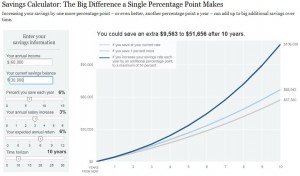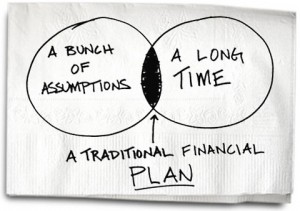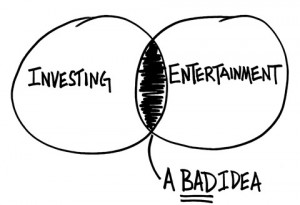Posts Tagged ‘personal finance’
401(k) Investors’ Achilles Heel #3: Expecting Investment Performance to do All of the Work
I have to give it to the NYTimes. Their new “Bucks” blog includes great insight from our friend Carl Richards of BehaviorGap.com. Just yesterday they posted a very easy to use, interactive 401(k) savings calculator that illustrates how increasing your contributions just 1% creates a very different retirement picture for you upon retirement, while avoiding…
Read MoreBeManaged April ’10 Newsletter – Stocks Accelerate and the Use of Bonds/Money Markets in Your 401(k)
The following are some of the topics discussed in this month’s newsletter from John Whaley, CFA, AIF, the Director of our Research Department.
Stock Gains Accelerate in March
Trends in Savings and Investments Among Workers
Use of Stable Value/Money Market Funds and Bond Funds in Your Retirement Portfolio
401(k) Investors’ Achilles Heel #2: Goal-Based Investing – Good or Bad?
This month, our team has conducted dozens of 1-on-1 consultations. During these consultations, we walk the 401(k) investor through an investor questionnaire that takes into account their age, time horizon for accessing their 401(k) assets, and their risk tolerance. During this review of their account, we consistently run into investors who have an expectation of what they need to achieve from a performance standpoint in order to meet their goals. Just as I was considering this, Carl Richards wrote an article (click the napkin to read) specific to whether financial plans are worth the paper they are drawn up on.
Read More401(k) Investor Achilles Heel #1: Overconfidence
From time to time, all of us think we know what we are doing when clearly we do not, but it is not until we are proven wrong that we come to realize it. For me, it’s home repair. I know it’s not my strong suit, but my “man” button keeps blinding me to that fact until I am calling the repairman to fix the original problem and everything additional that I destroyed, broke, etc.
That, my friends, is humility. And humility is good for all of us. When it comes to investing, such overconfidence in our abilities can be extremely costly. In fact, the larger the balance of your 401(k), the more costly mistakes can be to you.
Read MoreBeManaged March ’10 Newsletter – The Advancing US Dollar and Your 401(k)
The following are some of the topics discussed in this month’s newsletter from John Whaley, CFA, AIF, the Director of our Research Department.
Advancing US Dollar Translates to Declining Foreign Stock Returns
Mutual Fund Fees and the Impact on Your Acccount
How Does Your 401(k) Account Growth Compare?
Brokers Win, Investors Lose Key Reform – WSJ
Every investor working with a financial planner/wealth manager/financial advisor/stockbroker…whatever title is used…should read at least the following quote. In Jason Zwieg’s article on WSJ.com, he provides one of the easiest to understand summaries I have read on the responsibility that person has to you:
As of now, the roughly 630,000 brokers, bankers and insurance agents registered to sell securities must determine whether investments are “suitable”—based on how wealthy you are, what else you have invested in, your tax status and your investment objectives.
Securities salespeople generally aren’t obligated to act in your best interest. They needn’t tell you that they make extra money pushing one particular investment or that cheaper alternatives might provide you a higher return.
Suppose two mutual funds are “suitable,” but one of them pays the broker a fatter fee. You may well end up in that one—without finding out that your broker had an incentive to favor it.
On the other hand, financial advisers—who are regulated as “fiduciaries” under the federal Investment Advisers Act—are obligated to put you first. They must explain their fees, disclose conflicts of interest and disclose past infractions. If they get paid extra to recommend a fund or sell an insurance product, they have to tell you.
Read MoreStudies Show the Less You Do With Your 401(k), the More You Earn
ometimes, it helps to hear this from an independent source…
Don’t take this too personally, but the less you are involved with investment decisions for your 401(k) the better off you may be.
Sometimes, it helps to hear this type of thing from an independent source. As we have said before, we don’t fix our own cars, why should we be expected to be professional investment managers?
Don’t take this too personally, but the less you are involved with investment decisions for your 401(k) the better off you may be.
A new study of more than 400,000 401(k) participants in seven corporate plans found that the median return earned by individuals who sought out help in managing their 401(k) was 1.86 percentage points more than participants who made their own allocation/investment decisions.
Read MoreInvesting Is Not Entertainment
As you know, we are big fans of the BehaviorGap. Our friend Carl Richards is now being featured in the New York Times website. His latest post there is two minutes of really good advice.
Am I investing to meet my most important financial goals or am I investing as a form of entertainment? For almost all of us, it can’t be both.
Video: Quick and Easy 401(k) Moves
We are a fan of keeping things simple, so when we run across tips on how to do so, we like to make sure we share them with you. The following video is an example of such tips; this one specific to your 401(k) plan.
There is one thing we would like to add to the idea of consolidating your old 401(k)s: If your company has BeManaged available, many of our clients prefer to roll those old 401(k) accounts into their current account to make sure it is managed for them, instead of having to figure out where and what to invest in themselves. Often times they are nearing or already past the capped fee we charge, so there is little to no financial benefit to us, but a big one for our clients.
Read MoreWhy Is Your 401(k) In Trouble? Because You Don’t Have Time To Read This Post
Our lives are as busy as ever. Family, school activities, committees, church, associations…oh, and that job thing too. These are the days of never really “disconnecting” with laptops, netbooks and smart phones constantly keeping us informed and “connected.”
Additionally, the multitude of responsibilities we are responsible for continues to increase. Your 401(k)? Yeah, that’s one of them. Lack of time is the #1 response people give us when they sign up for our BeManaged or BeAdvised service.
Read More





